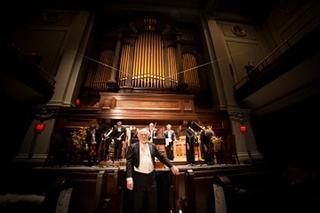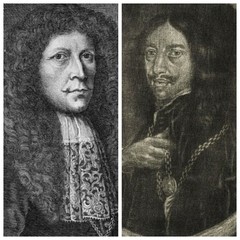|
Back
In One Era, Out the Other New York
First Church of Christ, Scientist
10/29/2022 -
Claudio Monteverdi: Orfeo: “Ritornelli, Sinfonie, Moresca à 5&7”
Giovanni Valentini: Sonata
Johann Heinrich Schmelzer: Lament for the death of King Ferdinand III
Jean-Baptiste Lully: Instrumental movements from Acis et Galatée
Johann Rosenmüller: Sinfonia quinta
Heinrich Ignaz Franz von Biber: Balletto
Henry Purcell: Select movements from King Arthur, or The British Worthy, Z. 628
Early Music Ensemble New York, Frederick Renz (Director)

F. Renz, Early Music Ensemble
“As poetry is the harmony of words, so music is that of notes; and as poetry is a rise above prose and oratory, so is music the exaltation of poetry.”
Henry Purcell
“Monteverdi is amazingly modern. And if one may say such a thing, near to me in spirit.”
Among other treasures uncovered by Frederick Renz last night, none is more significant than the name Giovanni Valentini! Who??
We go back to the beginning.
Frederick Renz is not only the conductor and a founder of Early Music New York, the most eminent permanent ensemble of pre‑Bach music. He is an eminent harpsichordist, a sterling conductor of music up through the 18th Century (positively avant‑garde to early‑music enthusiasts) and, last night, a man who, with minimal conducting fireworks, can unveil deeply‑buried musical gems.
Last night it was his turn to show, through music and program notes, how Italy most advanced inventive Italian music invaded Europe.
One would imagine this was natural. But without recordings, through blockades of religious and feudal wars, musical styles remained had remained firmly provincial.
Along came a minor contemporary of Monteverdi, aforesaid Giovanni Valentini. Monteverdi might have been idolized by the Italian aristocracy, later becoming the Stephen Sondheim of Venice–but totally unknown in Central Europe. Valentini broke the mold. He became Court Organist in Poland for ten years, he introduced all the liturgical and (probably) secular music, and set the gates open in Central Music for–what Maestro Renz called–the “origin of opera and modern style.”
The Early Music New York “Mappa Europa 1600‑1700” program was, as always, groundbreaking. Concertmaster Daniel S. Lee showed, in chamber works–sonatas, five‑part sinfonias, ballettos–extraordinary artistry. His partner Chloe Fedor and he exhibited “modern” techniques–including a quartet of pizzicati in Johann Schmelzer’s Lament
(I had assumed the pizzicato was invented by later Monteverdi, but Mr. Renz proved me wrong.)

H. I. F. von Biber/J. H. Schmelzer
In fact, it took a while to understand the four chamber works here. The initial orchestral works from Monteverdi’s Orfeo sounded muddy, dingy. They lacked the usual brass, winds and percussion we usually hear. Some by the composer, more often by transcriptions by August Wenzinger, or even more dubious rewriters by Respighi and Orff. Yet nobody could doubt Monteverdi’s wonderful tunes (!!) in the Moorish‑inspired dances.
(A personal anecdote. August Wenzinger and I once got soused on Thai whiskey in an outdoor Laotian nightclub. He not only loved the Lao music but joined in the dancing. This is not part of his scholarly curriculum vitae.
I personally, hardly a scholar, initially felt mired by the chamber sonatas, sinfonias and ballets. Yet, by the time of Schmelzer, Rosenmüller and Biber–the latter still famed for his solo violin pieces–I took a shortcut, and kept my ear on Mr. Lee, not worrying about the darker viola, cello and theorbo. Each of these composers had their middle 17th Century influence bringing music from the states of Italy to Germany and Austria. Mr. Renz described this in his most enlightening program notes which are hopefully downloadable.
The longer selections, from Lully’s Acis and Galatée, were disappointing. Lully, originally Italian, well knew the dances and arias of his birthplace. Louis XIV preferred the lighter dancing to lamentable vocal works. Thus the 13 pieces here were mainly ebullient, highly rhythmical. Perhaps a full orchestral ensemble would have done greater justice to Lully’s unfailing invention.
Or perhaps Mr. Renz and Early Music New York might bring us an entire Lully opera. Like Monteverdi, these operas are most Italian, most easy to hear, most lilting in their entirety.
How much did Henry Purcell know about Monteverdi? He certainly knew the theater, obviously knew the salacious literature. Yet from these selections of King Arthur, he was more influenced by Dowland songs than Monteverdi emotion.
Still, Mr. Renz could have implied one link of the centuries. Monteverdi’s Lamento d’Arianna, one of the most thrilling songs ever written. (Even the composer had it published separately from the opera.) Schmelzer’s Lament last night was more than doleful, showing happier times. And Purcell’s Lament from Dido and Aeneas is as wondrous as Monteverdi’s.
Mr. Renz is quite the scholar, and his ensemble has scholarly playing. If original instruments and original playing does not mesmerize audiences, he illuminated an era, helped explain the methodology of history and offered a Gonzaga-family variety-feast of music.
Harry Rolnick
|